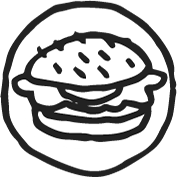

“It is considered axiomatic that pain depends on consciousness, so a demonstration that fishes can feel pain depends on showing that they are also conscious.”
I watch you wrestle the bass, gripping the base of the tail with your free hand. You harness the fish by pressing your thumb firmly into his distended lower jaw, then dislodge the hook from the gill bladder, fist-deep in his throat. A line of thinned blood rivers through his scales, then splashes on the tops of your bare feet. I squat beside the pond and pee, but keep you in my sight-line. Dropping the rod on the grass, you splay him out on the picnic table where he bucks and slaps—one lidless, dilated eye fixed to the sky. The fish does or does not feel pain. Yesterday, your father died. He fell off a ladder onto a concrete driveway and hit his head, after which he survived in a coma for four days. You are fishing now because a) it calms you; b) you wish to inflict pain to avoid feeling pain; c) you believe the spectacle of pain is the same as pain itself; d) all of the above.
The eyes of the largemouth glow when he feeds, you told me once, and I envisioned the waters electric at night, flash-lit, mirroring the fireflies in the sky; coded conversations between them. I don’t think that’s how it works, you’d said. What do we call behavioral responses to pleasure except love? Your father did not teach you how to fish. You learned small and quiet along the banks of David Pond while behind you he shellacked the smooth, tanned, pine boards that would become the stairs to the camp’s refinished loft. You love fishing largemouth for the fight, the slow circuitous stalking of prey before the strike, the water around the line swelling, then echoing out into larger and larger half-moons, the line spinning out as the fish arrows into the belly of the lake.
For four days, we hovered around his hospital bed while nurses came and went, shining flashlights into his pupils. The light waves entered and were swallowed. He did or did not feel pain. Doctors had removed a piece of his skull to reduce the swelling in his brain, but scans illuminated (on the bright screen in the dim room) whorls of gray like a churning hurricane. Like a stirred pot. Like a thousand indecent metaphors, each one less comprehensible than the last. The room glowed blue, which anyway, he couldn’t see.
I bought bagels no one could eat until they could. In millimeter increments, cans of Liquid Hope® were deposited into your father’s stomach via a feeding tube. You went to the bathroom to pee, and in your daze, forgot to tuck yourself back into your pants. After a stoic conversation with a nurse, she nodded briskly once at your crotch before walking away, leaving you staring down at your senseless, defeated organ and thinking, ‘Oh.’
You read the age of the fish in the rings around his scales. Six years (a tenth of your father’s natural life) nearly half of which has likely been spent near-motionless at the bottom of the pond. The average lifespan of a largemouth bass is sixteen years, which is the amount of time between when my father fell to his death and yours. The similarities end there, though.
Your father is dead and I am hungry. It would be indecent to kill and eat this fish, I know; instead, you will hold him tenderly in the shallows beside the dock, rocking him back to life, one gill gaping and torn, until he shivers violently, and then disappears.
They pumped saline into his veins in the hopes that he would float.
They kept the glacial cap of his skull chilling in a refrigerator.
Nurses pinched his toes and fingers, bent his thumb backwards against the hard ridge of a pen, but he did not flinch.
With our intact brains, we imagined and re-imagined his fall; the sound of his skull smacking against the concrete. On the driveway, a moon of blood bloomed and bloomed.
We sleep in the loft your father built, inside the same pool of time that contains the bass and the bed and the brain so swollen his eyes bulged beneath his eyelids. In two days, the bruises lightened and disappeared. What a strong body, the nurses commented, what a healthy heart. When they peeled back his lids, his eyeballs were round and wet and fixed in place. He lay motionless and we baited him from above, but he would not surface.
Forgive me: I do not mean to force the metaphor.
Only—when the nurses finally removed the lines from his veins, the tube from his gaping mouth, and the room hummed with fear while he stiffened, gasped, then cooled—his skin waxed yellow and I was stupid hungry and you were a wet, shook thing I wanted to take inside the dark of my mouth. Instead, we gathered our belongings: blankets, jackets, extra underwear, candy wrappers, water bottles, Chapstick, and tissues—all the wastes of the living—and drove to the house where your father used to live. For dinner, we ate the beans he had made in the Crockpot the morning of his fall, stewed in sliced onions and brown sugar, which a neighbor had put away in the refrigerator. We ate and ate and ate and when there was nothing left to eat, we tossed the Styrofoam bowls into the trashcan, drove here to the pond, cast into the water, and braced our bodies for the strike.